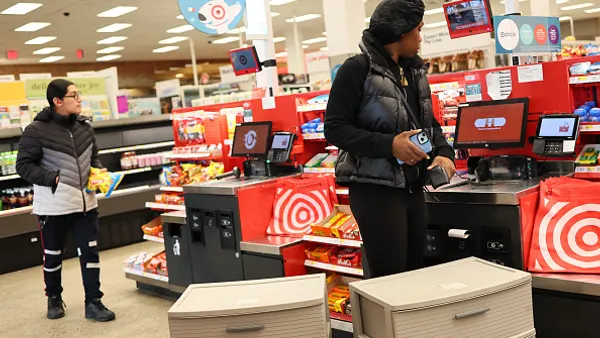As businesses across the U.S. work to adapt to new challenges posed by the COVID-19 pandemic, employers across the country are finding new ways to amplify employee benefits in an attempt to attract and retain hourly talent.
In a recent survey of over 300 HR executives across various industries¹ conducted by HR Dive's Brand Studio in partnership with Visa, more than three out of four HR executives said that reducing staff turnover was a critical or important priority in today’s environment. Offering alternative or additional financial benefits to reduce turnover was seen as a priority incentive, with 60% of HR executives saying that more workers had been vocal about their financial concerns. Further, 67% of HR executives said their organizations would be likely to explore new benefits if they would reduce workers’ financial stress during this time.
Financial-wellness benefits such as earned wage access (or EWA), which allows hourly workers to access their earned wages between pay cycles, can have a positive impact on talent, such as reducing stress caused by financial pressures. In turn, this can help enhance employee engagement, productivity, and overall retention². In fact, 37% of employers³ of hourly talent said their companies would explore or were interested in exploring EWA services as an employee benefit because of increased financial strain on their workforce.
Visa is partnering with EWA providers and their financial institutions to enable Visa Direct — Visa’s real-time⁴ push payments platform — to provide faster payouts and help workers on the front lines get access to their earned wages at the end of their shifts or whenever they need it most.
Growing interest in EWA can indicate that employers are thinking about talent in a new way — through the perspective of a pay experience. As organizations continue to explore effective models to develop more flexibility in workforce management (post COVID-19), supporting employee financial well-being is evidently establishing its place as a priority.
The changing world of work
Employers are experiencing unprecedented challenges and changes because of the COVID-19 pandemic; one of the most significant being the shift away from physical spaces of work for nonessential businesses. Essential places of business and the staff that operates them have had to adapt to rigorous new policies and protections — and added stress.
“We’re all human, so when employees are struggling, HR executives feel compelled to try to help,” said Cecilia Frew, senior vice president at Visa Direct, Visa. “Before the pandemic, there was already a significant amount of time employees spent thinking about or stressed about their finances. With increased financial concerns, a worker’s stress can intersect with their productivity and the issue of distraction at work comes to a head.”
Besides changes in the workplace, there have also been challenges with retaining trained hourly talent and finding new talent to meet an increase in demand in industries such as retail and health care. In the survey conducted by Visa and HR Dive, 44% of HR executives said they were hiring about the same number of hourly workers during the COVID-19 pandemic, and 16% said they were hiring more. This can lead to even more complex challenges in the changing world of work, with businesses who are looking to bring staff on, but are unable to hire as there are still many companies trying to differentiate themselves in their recruitment efforts.
The changing definition of a worker
Besides a changing work environment, the increased desire for financial-wellness support also comes at a time when the definition of a “worker” is evolving. The pandemic may also support trends toward a more gig-based workforce, which was a rapidly growing market pre-pandemic, with the rise of online and app-based services contributing to gig work’s popularity.
With the growth of the on-demand economy, hourly talent has an increasingly large number of options for finding work and getting paid for it quickly. EWA offers traditional employers, such as retail, hospitality, and manufacturing organizations, a convenient and low-cost way to match these in-demand benefits so hourly talent can improve their financial situation without switching or taking on another job.
“The growing necessity of on-demand pay during the pandemic is also affecting the ways companies recruit top talent,” said Jeanniey Walden, chief innovation and marketing officer at DailyPay, an EWA provider. “Our research shows that one in six people are looking for a job that offers an on-demand pay benefit.⁵ Over the next few months, as some businesses open up again, offering a daily-pay benefit will be essential in attracting quality new employees.”
Employers need to differentiate themselves by supporting a holistic approach to worker benefits
Benefits have always been a costly priority for employers. Now, more than ever, it’s critical HR executives consider how they can support employee financial wellness to ensure their workers stay safe and are able to work to keep their families and communities afloat.
“If you think about how much time we spend at work, it’s easy to see why it’s important for hourly talent to feel welcome and valued,” Frew said. “EWA gives employers the chance to embrace their desire to give employees the tools they need to help manage their finances through this incredibly stressful time. They accomplish all of this through a tool that can be easy to implement, and has the potential to have workers up and running with financial flexibility within weeks of offering it.”
Stepping into the future of work with earned wage access
Hourly workers know that their employer plays an important role in whether or not they can succeed in the future of work, and they’re choosing when and where to work based on that level of support.
EWA is a powerful financial-wellness benefit that can help give employers the opportunity to mitigate the financial uncertainty workers are experiencing today without a major added expense and puts talent in greater control of their financial lives. Employers who embrace benefits such as EWA are giving hourly talent the gift of less stress and more freedom to focus — and are stepping into the future world of work.
- Visa Hourly Talent Study (June - July 2020). Commissioned by Visa and conducted by HR Dive among 300 HR executives across various industries in the United States.
- Earned Wage Access Preferences Survey (April 2019). Commissioned by Visa and conducted by AYTM among 1,000 workers across varying industries in the United States.
- Visa Hourly Talent Study (June - July 2020). Commissioned by Visa and conducted by HR Dive among 300 HR executives across various industries in the United States.
- Actual fund availability depends on receiving financial institution and region.
- “Introducing the DailyPay Rehire America Index,” DailyPay, https://www.dailypay.com/dailypay-rehire-america/










